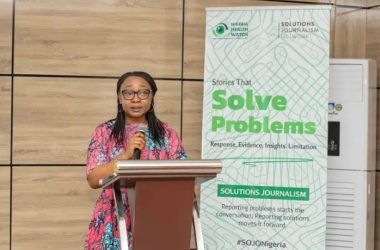Today, February 7, 2010, marks 24 solid years since this continent lost one of its few but meaningful offspring, Senegalese born Cheikh Anta Diop. Like the rest of his class of enormously instrumental figures on the continent’s historical legacy, Cheikh Anta can’t possibly be ignored, lest we shall be wronging our past, a situation we might live to regret for an unimaginable period.
In Senegal, the erudite national figure is being remembered by the staging of a symposium on his life and work. We here at Jollofnews have endeavor to republish two articles in his honor.
First a brief description of the focus of his work,‘CCHEIKH ANTA DIOP, The Pharoah of Knowledge’; originally written in French by Journalist Abdoulie John, and later translated and republished in English on the Banjul based Foroyaa (Freedom) Newspaper, by Honorable Sidia Jatta, member of National Assembly in Gambia. And then we republish his biography, courtesy of La Quotidian, a major daily newspaper in Dakar.
CHEIKH ANTA DIOP,
The Pharoah of Knowledge
This article was originally authored in French by Abdoulie John. It was translated into English form the French version, “Cheikh Anta Diop, le Pharaon du Savoir”, by Sidia Jatta, and published by the Banjul based FOROYAA (Freedom) Newspaper in February, 1997.
On the 7th of February, 1986, Africa lost one of her illustrious sons, Cheikh Anta Diop, an exceptional African whose singular destiny and contributions were in tune with an Africa sometimes promising, hopeful and some times despondent.
While leaving us, Professor Cheikh Anta Diop bequeathed to Africa a heritage of liberation without precedence: the knowledge of one’s origin.
It would not strike the mind of any historian of the ancient Mediterranean civilizations to deny the crucial role played by black Egyptian peoples, in deed Ethiopians, in the development of sciences, arts, techniques, and it was from distant antiquity. The idea of “black tabula rasa”, (Africa devoid of history (culture); in short, devoid of humanity, dear to colonial histography is largely posterior.
Cheikh Anta Diop led throughout his life a pathetic struggle so that Africa might at long last get rid of the claws of cultural alienation which had lasted far too long, so that they would again become masters of a history which they had not lost before colonialism. “Black nations and culture” was within the context of an intense ideological struggle opposing the most awakened and conscious elements, the most politically awakened of the African elites to the tenants of colonial order who, to be witnesses to its collapse, were nonetheless less solid and untouchable.
The European Africanists schools (all tendencies mixed) were unanimous in rejecting, more often without examining, the fundamental theses of Cheikh Anta Diop relating to the “cultural unity” of Africa to the migrations which, taking their source from the original neolithic basin, had ended up in the present peopling of the continent; to the continuity of the national historical past of Africans. It is that, in the eyes of some, the works of the Senegalese historian appear a dangerous precedent susceptible, like every pioneering and innovative work, to incite dangerous vocations.
This concern was based on at least one point: the disintegration by Cheikh Anta Diop of the fundamental postulates of the European Africanist discourse. Thus we read: “This false attribution of values of Egypt qualified as white to a Greece equally white reveals a deep contradiction which is not the least proof of the black origin of Egyptian civilization” (Nations Negres et Culture, page 40, Vol II, Presence Africaine, 3 em edition).
In that fragment Cheikh Anta Diop links up the well being with the “umbilical cord” which links “black” ancient Egypt to the rest of the continent. similarly, the insoluble contradiction which made that pharaonic Egypt, the mother of civilizations, does not the least objectively belong to a continent judged to be savage, primitive and barbarous, finally finds a rational solution.
In that regard, to measure the same time the revolutionary character of Cheikh Anta Diop’s thesis and the extent of the mystification of colonial histography, let us listen to Frederich Hegel, its most qualified and profound representative: “She (Africa) is no part of the historic world, she neither shows movement nor development………, that is to say, from the north originates the Asiatic and European worlds. Cartage was in that regard an important and transient element. But it belongs to Asia a Phoenician colony. Egypt would be examined through the passage of the human mind from the east to the west, but it does not depend on the African mind.” (La raison dans L’Histoirem, p 269, collection 10-18).
Through this odious falsification of history, which Karl Max qualifies as idealist, a road was made which led to the myth of anti historicity of the African continent; which continent is seen to be, in perspective of Cheikh Anta Diop, the cradle of all civilizations.
It is against such allegations, qualified rightly, by the first historian of African renaissance, Cheikh Anta Diop, as “fascist” and “racist” (in the sense that they implied the incapacity of Africans to create viable political institutions), that his major work “Nations Negres et Culture”, reacted. It can be deplored that his prodigious erudition, his epic style, his liberating breath had not inspired all the African intellectuals of that epoch. Worst still, African history as it is taught today in our schools does not take the Negroid dimension of ancient Egypt.
But an important question arises: in what measure do the works of Cheikh Anta Diop allow to respond to the challenges of the future? For Theophile Obenga, a disciple and a companion of the author, “with Cheikh Anta Diop, history is not defined as the study of the past of human kind, but as the construction of the future in the name of life.”
Cheikh Anta Diop was not only an intellectual, he also had a past as a man of action who did not hesitate to embrace political militantism when he judged it necessary. It was in that regard that he published scathing and brilliant articles in “La voix d’Afrique”, a journal of students of the RDA (Rassemblement Democratique Africain). One of his articles appeared in February, 1932, and already he had put (at an epoch where most African parliamentarians opted for a policy of compromise – not to say betrayal) on the agenda the question of independence and the federation of the ex-colonies.
One sees it, the political doctrine of Cheikh Anta Diop, consigned to “the economic and cultural foundations”, having as a philosopher’s stone the notion of unity under its federal or confederal form. A certain number of factors converged to render indispensable a political unity: the imperatives of economic independence, industrial development, the inconsistencies of political entities issuing from colonialism, and the cultural unity of Black Africa.
These theses, to say the truth, are neither new nor original. One remembers the itinerary of Kwame Nkrumah, almost all of whose works and, in particular the famous book entitled “Africa Must Unite”, offer a brilliant illustration.
Nevertheless, in the light of the political experiences of African states since 1960, one realizes that as regards the economic, political and cultural necessities of unity in order to formulate an ideology of development and liberation, they are notoriously insufficient. Such a move can only end up in a voluntarist and idealist practice which substitutes the categorical imperative of unity for contradictions and objective movements of African societies – the pseudoSenegambia Confederation is a patent example of it. Here resides one of the major contradictions which undermine the work.
In effect, no infallible mathematical law has yet demonstrated that because the ancient past of a people was brilliant, so its future must, with the fatality of bronze law equally be. Undoubtedly, it has to be underscored (and deplored) that in his persistence, by the way quite judicious, to defend the thesis of “Black Egypt”, the author did not analyse the concrete social realities of the African peoples in a satisfactory way; far from being homogeneous, far from constituting the only and same group of democratic and colonized, (who were disunited by interests fundamentally antagonistic, which explain the present impasses having names such as Rwanda-Burundi, Nigeria an so on and so forth.
Only these contradictions explain the relatively inefficient character of an action which, at the RDA, as at the level of the Senegalese block of masses (which later became RND – National Democratic Assembly), only realized ephemeral successes. It is now the lot of today’s African generation and that of tomorrow to tap the energy emanating from the monumental heritage that Cheikh Anta Diop has bequeathed to us, to propel Africa into the first row of the international community in order to remake it as a continent of inventions and liberty. This is the challenge that the pharoah of knowledge (the ancestor of our future) has bequeathed as heritage to the African youth.
A Brief Biography of Cheikh Anta Diop
“In practice it is possible to determine directly the skin colour and hence the ethnic affiliations of the ancient Egyptians by microscopic analysis in the laboratory; I doubt if the sagacity of the researchers who have studied the question has overlooked the possibility.” — Cheikh Anta Diop, Senegalese historian, physicist and politician.
Cheikh Anta Diop, a modern champion of African identity, was born in Diourbel, Senegal, on December 29, 1923. At the age of twenty-three, he journeyed to Paris, France, to continue advanced studies in physics. Within a very short time, however, he was drawn deeper and deeper into studies relating to the African origins of humanity and civilization. Becoming more and more active in the African student movements then demanding the independence of French colonial possessions, he became convinced that only by reexamining and restoring Africa’s distorted, maligned and obscured place in world history could the physical and psychological shackles of colonialism be lifted from our Motherland and from African people dispersed globally.
His initial doctoral dissertation submitted at the University of Paris, Sorbonne, in 1951, based on the premise that Egypt of the pharaohs was an African civilization — was rejected. Regardless, this dissertation was published by Presence Africaine, under the title: Nations Negres et Culture, in 1955. It won him international acclaim. Two additional attempts to have his doctorate granted were turned down until in 1960, when he entered his defense session with an array of sociologists, anthropologists and historians and successfully carried his argument. After nearly a decade of titanic and herculean effort, Diop had finally won his Docteur es Lettres!
In that same year, 1960, were published two of his other works — the Cultural Unity of Black Africa and Pre-colonial Black Africa.
During his student days, Cheikh Anta Diop was an avid political activist. From 1950 to 1953, he was the Secretary-General of the Rassemblement Democratique Africain (RDA) and helped establish the first Pan-African Student Congress in Paris in 1951. He also participated in the First World Congress of Black Writers and Artists held in Paris in 1956 and the second such Congress held in Rome in 1959. Upon returning to Senegal in 1960, Dr. Diop continued his research and established a radiocarbon laboratory in Dakar.
In 1966, the First World Black Festival of Arts and Culture held in Dakar, Senegal, honored Dr. Diop and Dr. W.E.B. DuBois as the scholars who exerted the greatest influence on African thought in the twentieth century. In 1974, a milestone occurred in the English-speaking world when the African Origin of Civilization: Myth or Reality, was finally published. It was also in 1974 that Diop and Theophile Obenga collectively and soundly reaffirmed the African origin of pharaonic Egyptian civilization at a UNESCO sponsored symposium in Cairo, Egypt. In 1981, Diop’s last major work, Civilization or Barbarism: An Authentic Anthropology, was published.
Dr. Diop was the Director of Radiocarbon Laboratory at the Fundamental Institute of Black Africa (IFAN) at the University of Dakar (Now renamed Chiekh Anta Diop University, in his honor). He sat on numerous international scientific committees and achieved recognition as one of the leading historians, Egyptologists, linguists and anthropologists in the world. He traveled widely, lectured incessantly and was cited and quoted voluminously. He was regarded by many as the modern `pharaoh’ of African studies.
Cheikh Anta Diop died quietly in sleep in Dakar, Senegal, on February 7, 1986, hence this day is commemorated.
Trending :
- 8 hours ago
- NPP Announces Mega Rally In Mamuda Village To Launch 2026 Re-Election Campaign
- 10 hours ago
- Sabally Criticises Gibba’s Religious Conduct, Says “A Beard Doesn’t Make You A Good Muslim”
- 1 day ago
- Halifa & CDS Cham Contradict Each Other
- 3 days ago
- Darboe Urges Barrow To Convene National Conference On Irregular Migration, Strengthen Maritime Security
- 3 days ago
- Halifa Says Need To Safeguard PDOIS Prevented Party From Joining NPP Coalition




